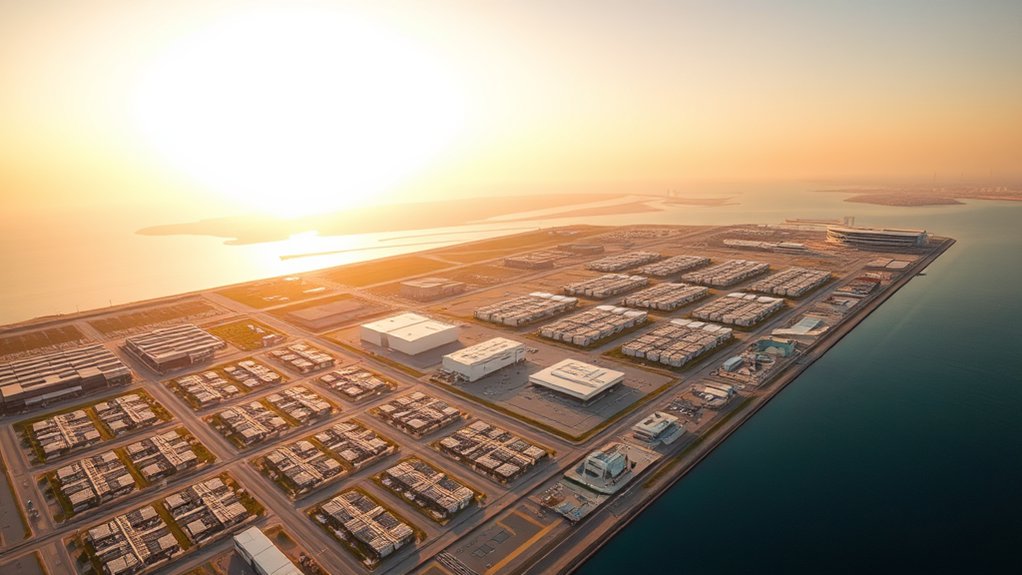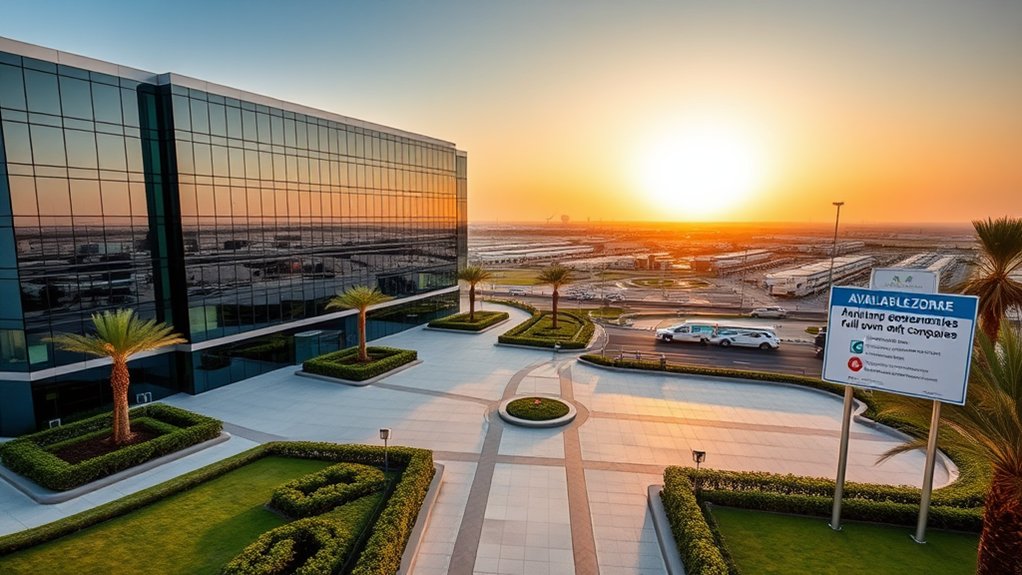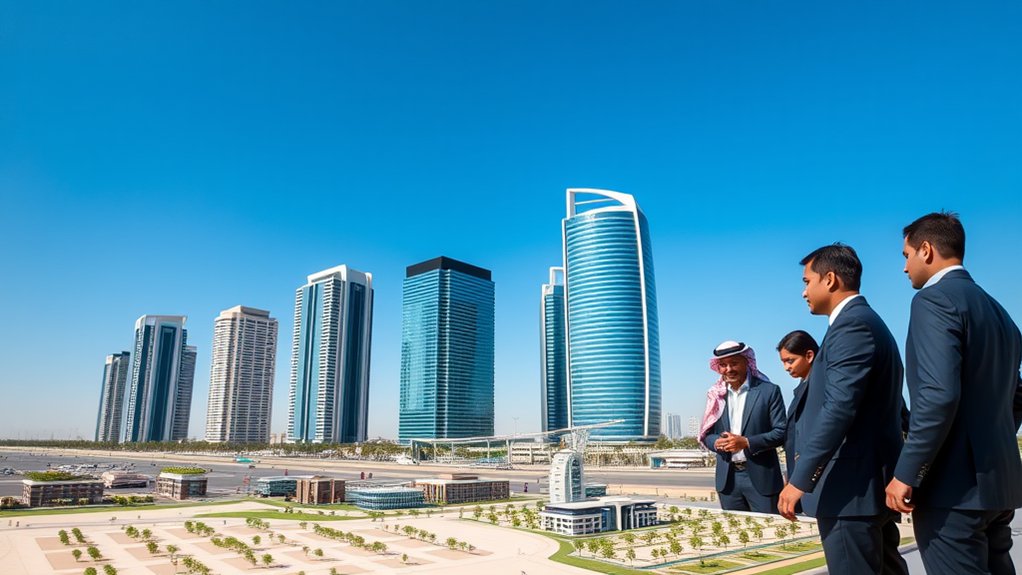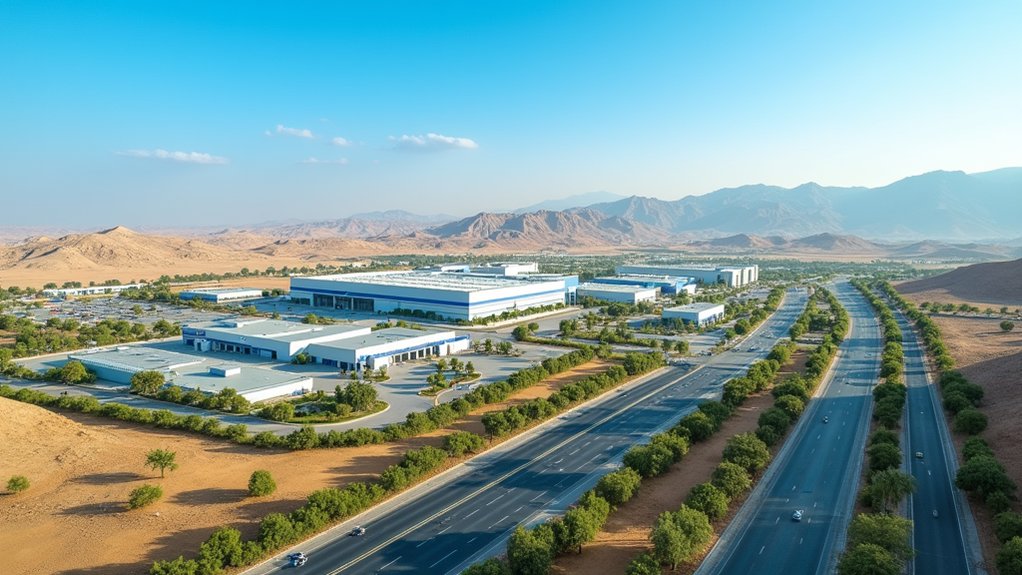Imagine a key that opens the door to limitless business opportunities—this is what the RAK Free Zone offers foreign investors. You might be wondering how this unique environment allows for 100% ownership without a local partner. The flexibility in ownership structures and the various types of companies you can establish make it an attractive option. However, before you decide to make your move, it's crucial to explore what this means for your business strategy and long-term goals. What could this opportunity mean for your investment ambitions?
Overview of RAK Free Zone

The RAK Free Zone, established in 2000, offers a strategic business environment for foreign investors looking to expand their operations in the UAE. With robust RAK infrastructure, businesses benefit from modern facilities and efficient logistics. The area is well-connected to major highways and has access to a deep-sea port, making it easy to import and export goods. In addition, the RAK business environment supports a variety of industries, including manufacturing, trading, and services. You'll find flexible office spaces and customizable warehouse options that fit your needs. Regulatory support simplifies the setup process, ensuring you can focus on your business. Overall, RAK Free Zone is designed to facilitate growth and innovation for foreign companies in the region. Furthermore, the zone offers cost-effective business setups that attract a diverse range of investors.
Benefits of RAK Free Zone
In the RAK Free Zone, you can enjoy 100% foreign ownership of your business, which means you keep full control. Additionally, there are attractive tax incentives that can help you save money and reinvest in your company. These benefits make it an appealing option for foreign investors looking to establish a presence in the UAE. Furthermore, RAK allows for flexible corporate structure options, providing investors with the ability to tailor their business according to specific needs.
100% Foreign Ownership
While many regions impose restrictions on foreign ownership, RAK Free Zone stands out by allowing 100% foreign ownership of businesses. This benefit empowers you as a foreign investor, ensuring your rights are protected without ownership limitations. Here are three key advantages of this structure:
- Complete Control: You can manage your business without needing a local partner.
- Asset Protection: Your assets remain solely yours, reducing risks associated with shared ownership.
- Flexible Operations: You can make decisions quickly and efficiently, adapting to market changes without external approvals.
RAK Free Zone's policy fosters a supportive environment for international businesses, making it an attractive option for those looking to establish operations in the UAE. Additionally, the benefits of 100% foreign ownership in free zones like RAK enhance the appeal of setting up your business, ensuring an efficient and profitable venture.
Tax Incentives Offered
RAK Free Zone not only offers 100% foreign ownership but also provides attractive tax incentives that further enhance its appeal for investors. One of the key tax benefits is the exemption from corporate taxes for a minimum of 15 years, which can often be renewed. You won't have to worry about personal income taxes either. This means you can keep more of your profits. Additionally, there are no import or export duties, making it easier to trade internationally. These investment incentives make RAK Free Zone a competitive choice for setting up your business. Overall, the tax advantages help you maximize your returns and encourage long-term growth in a thriving environment.
Ownership Structures in RAK

Understanding ownership structures in the RAK Free Zone can greatly impact your investment decisions. Different ownership models offer various advantages, affecting how you strategize your investments. Here are three key ownership structures to evaluate:
- Sole Proprietorship: One individual owns the business, allowing for complete control but also full liability.
- Limited Liability Company (LLC): This model limits your personal liability, protecting your assets while allowing multiple owners.
- Branch Office: You can establish a branch of your foreign company, maintaining a direct connection to your main operations.
Each of these ownership models can shape your investment strategies and influence your overall success in the RAK Free Zone. Choose wisely to align with your business goals and risk tolerance. Furthermore, understanding the 100% foreign ownership policy in the UAQ Free Zone can provide additional opportunities for investors looking to maximize their business potential.
100% Foreign Ownership Explained
When you consider investing in the RAK Free Zone, understanding foreign ownership regulations is essential. These rules allow you to maintain full ownership of your business, which can be a significant advantage. Knowing the benefits and guidelines surrounding foreign ownership will help you make informed decisions about your investment. Additionally, the RAK Free Zone offers 100% foreign ownership, which is a key factor attracting many entrepreneurs to the region.
RAK Free Zone Benefits
Foreign ownership in the RAK Free Zone offers significant advantages that can enhance your business's potential. By establishing your company here, you can take advantage of various benefits that support business growth and investment opportunities. Here are three key benefits:
- Strategic Location: The RAK free zone provides easy access to global markets, facilitating trade and commerce.
- Operational Flexibility: You can enjoy complete control over your business operations, allowing you to adapt quickly to market changes.
- Cost Efficiency: With lower overhead costs and tax incentives, your business can maximize profits while minimizing expenses.
These factors contribute to a thriving entrepreneurial ecosystem, promoting industry diversification and ensuring resource availability for your business.
Ownership Regulations Overview
Establishing your business in the RAK Free Zone not only offers strategic advantages but also comes with specific ownership regulations that can impact your operations. In this free zone, foreign investors can fully own their companies without the need for a local partner. This ownership type allows complete control over business decisions and profits. However, it is vital to understand the regulatory landscape governing these ownership types. Compliance with local laws and regulations is fundamental for smooth operations. Additionally, businesses must guarantee they meet specific licensing requirements. By familiarizing yourself with these regulations, you can navigate the process effectively and enjoy the benefits of full ownership while minimizing potential risks.
Types of Companies Allowed

While exploring opportunities in the RAK Free Zone, you'll find a variety of company types that can be established. These company types cater to different business sectors, allowing you to choose based on your interests and goals.
Here are three common types of companies you can set up:
- Free Zone Company (FZC): Ideal for small to medium businesses, allowing multiple shareholders.
- Free Zone Establishment (FZE): Suitable for single-owner businesses, offering full ownership and liability protection.
- Branch Office: If you have an existing company outside the UAE, you can establish a branch to operate in the RAK Free Zone.
Each of these options provides unique benefits tailored to various business needs. Understanding these company types is essential for making informed decisions.
Licensing Requirements
When you're looking to set up a business in the RAK Free Zone, understanding the licensing requirements is essential. You'll need to familiarize yourself with the free zone regulations, the types of business licenses available, and the ownership structures that are permitted. Meeting these criteria will help guarantee your venture operates smoothly from the start.
Free Zone Regulations
To successfully operate in the RAK Free Zone, understanding the licensing requirements is essential. As a foreign investor, you'll find several benefits, including full company ownership options. Here are three key licensing requirements to evaluate:
- Business Plan: You need a clear business plan outlining your activities, objectives, and market analysis.
- Capital Investment: A minimum capital investment is required, which varies based on your chosen business activity.
- Documentation: You must provide specific documents, such as identification and proof of address, to support your application.
Business License Types
Understanding the different types of business licenses available in the RAK Free Zone is vital for your investment strategy. You'll encounter several business license types, each tailored for specific activities. The primary licensing categories include trading, services, and industrial licenses. If you plan to buy and sell goods, a trading license is what you need. For offering services like consulting or marketing, opt for a service license. An industrial license is required if you intend to manufacture products. Each license comes with its own set of requirements and fees, so it's important to research thoroughly. By choosing the right license, you can guarantee compliance and streamline your business operations in the RAK Free Zone.
Ownership Structures Allowed
While exploring investment opportunities in the RAK Free Zone, it's crucial to grasp the various ownership structures allowed under the licensing requirements. Understanding these ownership options will help you make informed decisions and protect your investor rights. Here are the main structures available:
- 100% Foreign Ownership: You can fully own your company without needing a local partner.
- Free Zone Company (FZC): This allows multiple shareholders, and you can still maintain full ownership.
- Branch Office: If you already have an established company, you can set up a branch in the RAK Free Zone, operating under the same ownership.
These structures guarantee that you have flexibility and control over your investment in the RAK Free Zone.
Regulatory Authority in RAK

The regulatory authority in the Ras Al Khaimah (RAK) Free Zone plays a crucial role in ensuring a smooth and efficient business environment for foreign investors. This authority oversees the regulatory framework that governs business operations within the zone. It is responsible for issuing licenses, regulating business activities, and ensuring compliance with local laws. Additionally, the authority functions to provide support and guidance to investors, helping them navigate the legal and procedural aspects of setting up their businesses. The regulatory authority also promotes transparency and fair practices, which are essential for attracting foreign investment. By understanding these functions, you can better appreciate how the RAK Free Zone supports your business endeavors.
Steps to Set Up a Business
Setting up a business in the RAK Free Zone involves a few key steps. You'll need to apply for a business license, meet office space requirements, and understand shareholder structure regulations. Each of these elements is essential for ensuring your business operates smoothly and legally.
Business License Application Process
Maneuvering the business license application process in the RAK Free Zone is essential for establishing your venture. To successfully apply for your business license, follow these steps:
- Prepare Required Documents: Gather all necessary paperwork, such as your passport copies, business plan, and proof of investment.
- Submit the Application: Fill out the application form accurately and submit it to the RAK Free Zone Authority. Make certain you include all required documents to avoid delays.
- Receive Approval and License: Once your application is reviewed, you'll receive approval. After that, you can collect your business license and start operating.
Completing these steps efficiently will help you navigate the application process and set your business on the right path.
Office Space Requirements
Securing the right office space is a crucial step in establishing your business within the RAK Free Zone. You'll find various office space options, including shared offices, private offices, and flexi-desks. Each option caters to different business needs and budgets. When choosing, consider your company size and future growth plans. Once you've selected an office space, you'll need to enter into leasing agreements. These agreements outline the terms of your rental, including duration, costs, and any additional services. It's important to review these terms carefully to guarantee they fit your business model. By securing appropriate office space and understanding your leasing agreements, you set a solid foundation for your company's success in the RAK Free Zone.
Shareholder Structure Regulations
Once you've established your office space, the next step involves understanding the shareholder structure regulations for your business in the RAK Free Zone. Different shareholder types can affect how you structure your company. Here are key points to take into account:
- Ownership Limits: In the RAK Free Zone, foreign investors can fully own their businesses without the need for a local partner.
- Shareholder Types: You can opt for individual shareholders or corporate shareholders, depending on your business needs.
- Share Capital Requirements: Verify you meet the minimum share capital requirements as specified for your chosen business activity.
Capital Requirements

When considering investment opportunities in the RAK Free Zone, understanding the capital requirements is fundamental. You need to be aware of the minimum capital investments needed to establish your company. These funding requirements vary based on the type of business you want to set up. Generally, the RAK Free Zone mandates a minimum capital of AED 50,000 for most businesses. However, some sectors might require higher amounts. It's vital to have this capital readily available when applying for your business license. Make certain you understand how these capital investments fit into your overall business plan. By preparing in advance, you can guarantee that you meet all necessary funding requirements and set your company up for success in the free zone.
Tax Advantages for Investors
Investing in the RAK Free Zone offers significant tax advantages that can enhance your business's profitability. As an investor, you can take advantage of various benefits that support your growth and financial strategy. Here are three key tax benefits that make RAK an attractive option:
- Zero Corporate Tax: You won't pay any corporate taxes on your profits, allowing you to reinvest your earnings.
- No Personal Income Tax: You can keep more of your income, as there's no personal income tax in the Free Zone.
- Full Repatriation of Profits: You can transfer your profits without restrictions, ensuring you benefit fully from your investments.
These investor incentives make the RAK Free Zone a strategic choice for foreign businesses.
Lease and Property Options

The RAK Free Zone provides a variety of lease and property options tailored to meet the needs of foreign investors. You can choose from flexible lease agreements for office spaces, warehouses, and land. These options are designed to support various business activities. Property management services are also available, ensuring that your investment remains well-maintained and operational.
| Property Type | Lease Duration |
|---|---|
| Office Space | 1-5 years |
| Warehouses | 2-5 years |
| Land for Development | 5-20 years |
| Flexi-Desk Options | Month-to-month |
Understanding these lease and property options is essential for making informed decisions in the RAK Free Zone.
Banking and Financial Services
Access to banking and financial services in the RAK Free Zone can greatly enhance your business operations. These services offer you the chance to tap into various investment opportunities while ensuring regulatory compliance. Here are three key benefits:
- Local and International Banking: You can open accounts with banks that cater to both local and global markets, streamlining transactions and operations.
- Financing Options: You'll find diverse financing solutions tailored for businesses, which can help you grow and manage cash flow effectively.
- Currency Flexibility: Access to multiple currencies helps you conduct international trade seamlessly and minimizes exchange rate risks.
Utilizing these banking and financial services can considerably support your business goals in the RAK Free Zone.
Challenges for Foreign Investors

What hurdles might you encounter as a foreign investor in the RAK Free Zone? First, you'll face investment risks tied to market competition and economic fluctuations. Understanding and maneuvering regulatory compliance can also be challenging. Cultural differences may affect business practices and communication, leading to potential misunderstandings. Legal challenges can arise, especially if you're unfamiliar with local laws. Additionally, securing funding access might prove difficult due to local banking requirements. Operational hurdles can emerge from adapting to the local business environment, while bureaucratic obstacles may slow down your processes. Finally, forming local partnerships is often essential for success, but finding the right connections can be time-consuming and complex. Being aware of these challenges can help you prepare effectively.
Success Stories in RAK
While maneuvering challenges can be intimidating, many foreign investors have found remarkable success in the RAK Free Zone. These success stories highlight the potential for significant investment growth. Here are three notable examples:
- Tech Startups: Innovative tech companies have thrived, leveraging the free zone's advanced infrastructure to expand their reach.
- Manufacturing Firms: Several manufacturing businesses have reported impressive growth due to the strategic location and access to global markets.
- E-commerce Platforms: E-commerce companies have benefited from a business-friendly environment, allowing for quick setup and efficient operations.
These examples show that with the right approach, foreign investors can achieve their goals and contribute to the vibrant economy in RAK. The free zone continues to attract those seeking opportunities for growth and success.
Comparison With Other Free Zones

When you compare the RAK Free Zone to other free zones in the region, it's clear that it offers unique advantages that set it apart. One significant factor is the flexibility in ownership structures. Unlike some free zones that require local partners, RAK allows full foreign ownership of companies. This freedom makes it a preferred choice for investors looking for control over their businesses. In a foreign investment comparison, RAK stands out with its simpler regulatory framework and streamlined processes. Other free zones may have more complex rules that can complicate business setup. Overall, RAK Free Zone provides an appealing option for those seeking to establish a fully owned venture without the constraints often found in other regions.
Future of RAK Free Zone
As the global economy continues to evolve, the future of the RAK Free Zone looks promising for foreign investors. Several factors contribute to this outlook, indicating strong future growth. You can anticipate the following trends:
- Increased Infrastructure Development: Ongoing improvements will enhance logistics and accessibility.
- Diverse Industry Opportunities: Expanding sectors, such as technology and renewable energy, will attract new businesses.
- Supportive Government Policies: Favorable regulations and incentives will encourage foreign investments.
These market trends suggest that the RAK Free Zone will remain an attractive destination for investors. By keeping an eye on these developments, you can make informed decisions about your investments in the region. The opportunities for growth and profit seem to be increasing, making it a wise choice for your business endeavors.
Key Takeaways for Investors

The promising outlook for the RAK Free Zone presents significant opportunities for foreign investors. Understanding investment strategies and ownership trends is essential for making informed decisions. Here are some key takeaways to reflect upon:
| Aspect | Key Points | Recommendations |
|---|---|---|
| Ownership Structure | 100% foreign ownership allowed | Explore local partnerships |
| Regulatory Framework | Business-friendly laws | Stay updated on changes |
| Market Potential | Growing sectors available | Focus on high-demand industries |
Frequently Asked Questions
Are There Any Restrictions on the Type of Business Activities?
Yes, there're business activity limitations in RAK Free Zone. You'll face investment sector restrictions depending on the nature of your business, so it's crucial to research and guarantee compliance with local regulations before proceeding.
What Is the Process for Transferring Ownership of a Company?
Transferring ownership is essential, yet straightforward. You'll need to update the company registration documents, notify authorities, and guarantee all parties agree. This seamless process keeps your business thriving while adapting to new ownership dynamics.
Can Foreign Investors Apply for a UAE Residency Visa?
Yes, you can apply for a UAE residency visa as a foreign investor. The process involves submitting necessary documents, proving financial stability, and meeting specific criteria set by the UAE government for residency applications.
Are There Any Local Sponsorship Requirements for Foreign Investors?
When you're considering local sponsorship, you'll find that local regulations vary. Some areas require sponsorship agreements, while others don't. It's crucial to research specific requirements in your chosen region to guarantee compliance.
What Are the Costs Associated With Maintaining a Company in RAK?
It's interesting how maintaining a company in RAK involves various costs. You'll encounter company maintenance fees, operational expenses, and additional charges for services. Planning for these will guarantee your business runs smoothly and efficiently.
Conclusion
To conclude, the RAK Free Zone offers attractive opportunities for foreign investors with its 100% ownership model. Notably, over 12,000 companies have already established themselves in this region, highlighting its appeal. With various company types available, you can choose what best fits your business needs. The supportive environment and lack of local partner requirements make it a compelling option for those looking to invest. Consider the RAK Free Zone for your next business venture.












